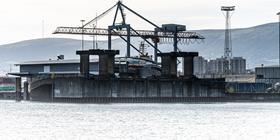
Calls are growing for the government to improve communication with the logistics industry amid continuing trade disruption across the new Irish Sea border between Britain and Northern Ireland.
The government reported on 8 January that700 trucks had been turned awayat the borderand 150 fines had been issued for non-compliancebecause shipments didn’t arrive with the correct paperwork.
Meanwhile, Unsworth, a customs clearance broker, said it expected queues to build this week as more cargo is sent from Britain across the Irish Sea, saying problems are likely to worsen before they improve.
“Traders are still just not ready and the government is not doing enough to support them,” said the broker’s commercial director Charles Hogg.
“We are seeing huge backlogs on Irish Sea movements and 80 per cent of our customers have paused movements due to backlogs and a lack of clarity on process and timings on paperwork. This issue is likely to get worse over the coming days as huge volumes are stuck on trailers in yards awaiting dispatch.”
Since the UK left the EU at the end of 2020, some fresh produce suppliers and hauliers have struggled to adapt to the new trading arrangements and paperwork required.
This has caused temporary shortages of certain products, including some fruit and veg, in a growing number of supermarkets in Northern Ireland.
Many are blaming a lack of clarity around the new border requirements and the fact that the Brexit deal was announced just days before the end of the transition period, giving businesses very little time to prepare necessary paperwork and customs arrangements.
Elizabeth de Jong, director of policy at Logistics UK, said: “Issues which have occurred at the GB/NI border are due, in part, to businesses not having a full understanding of the new border requirements for moving goods to and from Northern Ireland.
“With only five days from the announcement of a new trade deal with the EU to the end of the Transition period, some confusion is inevitable, but it is now vital that government steps up communication with industry to ensure that loads can be dispatched with the correct paperwork and declarations.
“Logistics is adaptable and resilient and wants to do the best for its customers. However, the logistics sector cannot prepare alone: traders, transport companies, government agencies – both here and in the EU – all need to make sure that their processes and understanding is sufficient.
“Freight from GB to NI has seen particular challenges: the GVMS system used for all GB-NI freight was only fully launched on the 23 December, while guidance on GB to NI freight providing a grace period for parcels and post was published on the 31 December.”
Logistics UK has written to Michael Gove and Lord Agnew with three key asks from the logistics sector:
1. Clearer communication of the administrative requirements, akin to the Border Operating Model for GB-EU trade.
2. Simplifications, derogations and mitigations for all goods moving from NI to GB.
3. The immediate restart of NI Protocol working groups, which do not yet appear to be functioning.
The government insists that the flow of goods between Britain and Northern Ireland has generally been smooth, but Labour has also called on the government to take action to tackle the border issues.
The BBC reported that in a letter to their government counterparts, shadow secretary of state for Northern Ireland Louise Haigh and shadow chancellor of the Duchy of Lancaster Rachel Reeves urged the government to provide better guidance for British companies shipping to Northern Ireland as freight volumes start to increase.
The shadow ministers wrote: 'The failure to properly prepare GB businesses for the huge changes in the trading relationship with Northern Ireland is having real consequences.
'Incredibly rather than taking concrete steps to minimise disruption, the secretary of state for Northern Ireland is in denial and simply pretending the border does not exist.
'The Northern Ireland Protocol has to be made to work; that's why we need urgent action to iron out these issues.'
A government spokesperson said: 'There are no significant queues at NI ports and supermarkets are reporting healthy supplies into their Northern Ireland stores.
'We recognise the need to provide as much support to the haulage sector as possible as industry adapts to new processes.
'We have been engaging intensively with the Irish authorities and hauliers on the issues that have been encountered for goods transiting through Dublin Port.'






No comments yet